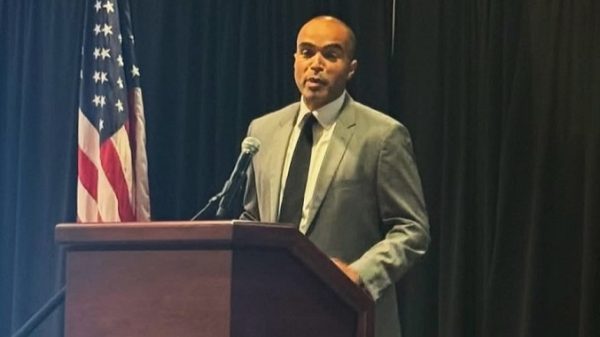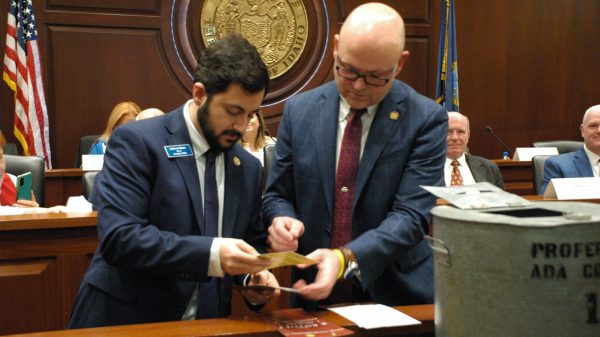(Idaho State) A North Idaho Republican lawmaker is bringing back a bill that would require a range of Medicaid reform meant to save costs for voter-approved Medicaid expansion to remain.
House Bill 138, by Rep. Jordan Redman, R-Coeur d’Alene, would require the Idaho Department of Health and Welfare to implement work requirements for able-bodied Idahoans enrolled in Medicaid; cap Medicaid expansion enrollment at 50,000 people, or less than all disabled and senior Idahoans on Medicaid; and ban Idahoans on expansion from being eligible for Medicaid benefits after three years.
“This legislation provides safeguards to Idaho’s Medicaid program, ensuring its sustainability, prioritizing resources for needy populations, and promoting fairness and accountability,” Redman told the committee. “It establishes safeguards for the continued expansion of Medicaid eligibility for able-bodied adults, aligning the program with the principles of self-sufficiency, fiscal responsibility and integrity.”
The Idaho House Health and Welfare Committee on Tuesday unanimously introduced the bill on a voice vote.
Introducing the bill tees it up for a full committee hearing, including public testimony and a possible vote to advance it to the Idaho House floor.
Idaho lawmakers introduced a separate bill last month to outright repeal Medicaid expansion. Redman’s reform-or-repeal bill will have a committee hearing before the expansion repeal bill, Idaho House Health and Welfare Committee Chairman John Vander Woude, R-Nampa, told Idaho Capital Sun by text message.
To become law, bills must be approved by the Idaho House and Senate, and avoid the governor’s veto. If passed into law, the bill would take effect July 1.
If the bill’s sideboards aren’t implemented by July 1, 2026, Redman’s bill would repeal Medicaid expansion.
About 89,300 Idahoans are enrolled in Medicaid expansion, according to December figures from the Idaho Department of Health and Welfare.
“This legislation sets a bomb to go off in a year and a half, blowing up health coverage for tens of thousands of Idahoans,” Hillarie Hagen, senior policy associate with Idaho Voices for Children, said in a statement.
Bill is a repeat of what many feared was an expansion repeal with more steps, nonprofit says
The bill introduced Tuesday is similar to a bill Redman brought last year.
The House Health and Welfare Committee last year blocked that bill from advancing in a full committee hearing, after widespread negative testimony largely called the bill an effort to repeal Medicaid expansion with more steps, by relying on sideboards that likely wouldn’t get needed federal approval.
Repeating concerns about Redman’s previous bill, Idaho House Minority Leader Ilana Rubel, D-Boise, said she believed that the bill would “for all practical purposes, mean Medicaid expansion repeal.”
“Because some of these waivers we’ve asked for in the past, and they’re not possible to grant in compliance with the Affordable Care Act, which requires that there can be no additional cost beyond Medicaid,” she said.
The bill’s fiscal statement estimates it would likely save up to $163 million in state funds.
In response to concerns by Rubel about the savings estimate’s accuracy, Redman said the fiscal note is based on Idaho implementing safeguards that would save Idaho money to keep Medicaid expansion. And he said the federal government now — without mentioning the Trump administration specifically — is more likely to approve waivers for the sideboards.
“I’ve actually spoke to several folks at the new federal administration, and they said they’re looking for waivers that are unique and creative, that they want to grant,” Redman said. “And I believe that this year we’re going to have that opportunity to get these waivers granted.”
How the bill’s proposed Idaho Medicaid sideboards would work
Some of the bill’s proposed sideboards don’t appear to specify they would only apply to Medicaid expansion enrollees, but to able-bodied adults enrolled in Medicaid more broadly.
Idaho Medicaid expansion is a law, widely approved by Idaho voters in 2018 and implemented in 2020, that expanded income-based eligibility for Medicaid to 138% of the federal poverty level.
The bill outlines exceptions to the proposed work requirement program, including for people under age 19, people over age 64, as well as people who are pregnant, who have disabilities that prevent them from working, or who are caregivers of young children under age six or kids with disabilities.
Rep. Josh Wheeler, R-Ammon, said he would support introducing the bill and is supportive of guardrails as a concept. But he worried about the bill’s trigger mechanism to repeal expansion if the sideboards aren’t implemented.
“I’m concerned that that may not be our best way to govern. Because I’m worried that we’re going to give up our power as an elected legislative body to D.C. bureaucrats,” Wheeler said. “And I’m curious if you would give consideration to the idea of that trigger being for us to immediately have a full legislative review, rather than dissolution, essentially.”
Redman said he’d be happy to talk more about that.
The bill also includes a provision requiring Health and Welfare to ensure a maximum 5% improper Medicaid payment rate. According to the U.S. Government Accountability Office website, “improper payments are payments that should not have been made or that were made in an incorrect amount. While all fraudulent payments are considered improper, not all improper payments are due to fraud.”
This article originally appeared on Idaho Capital Sun.



















































